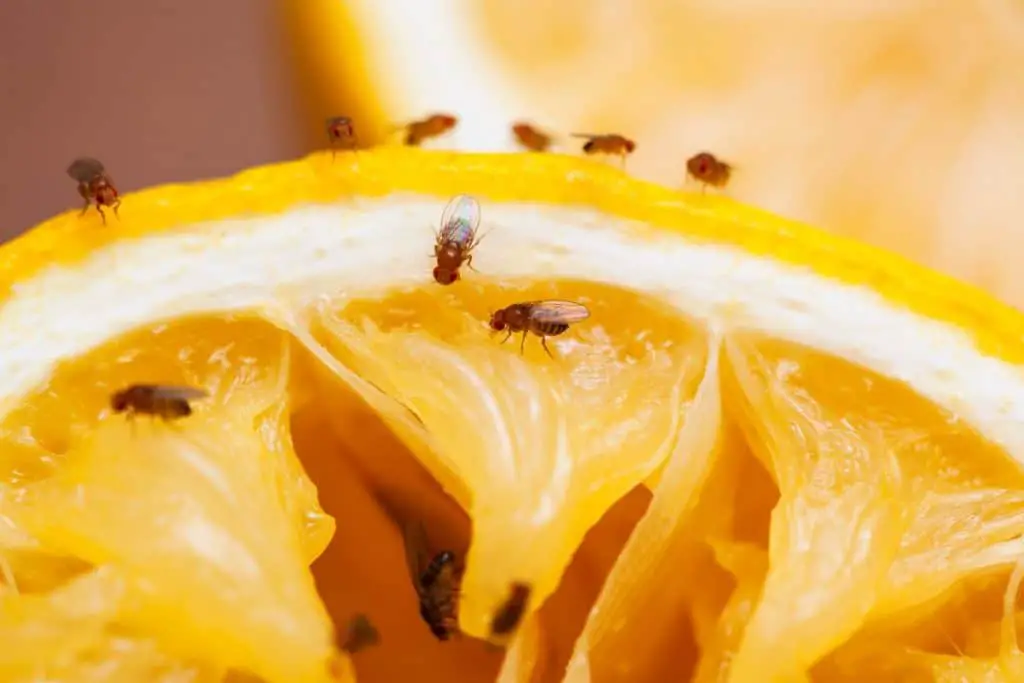So, what eats fruit flies? Fruit flies are small, winged insects that are typically attracted to overripe or decaying fruit. As their name suggests, fruit flies lay their eggs in fruit, which their larvae then feed on.
In addition to fruit, they also feed on plants and decaying organic matter. However, are there any organisms that prey on fruit flies?
Yes, In fact, there are a number of predators that will eat fruit flies, including spiders, dragonflies, ants, birds, beetle larvae, and the most common frogs!
All of these predators have different strategies for seeking out and catching fruit flies, ranging from swift aerial attacks to patiently waiting until they fly into a trap.
What About Their Larvae?
Fruit fly larvae are among the most vulnerable as they are not fully developed, like their adult counterparts. This makes them easy prey for predators such as:
- Ants
- Mites
- Crickets
- Staphylinid Beetles
In addition, fruit fly larvae are often found in exposed locations, such as on the surface of fruit or in open garbage cans. This leaves them even more vulnerable to attack.
Can You Get Rid Of Fruit Flies Using Predators?
Any home that has a large number of flies or other insects will naturally attract predators like house spiders or beetles. However, letting these predators stay in your home can be a bad idea!
Although they may reduce the number of fruit flies in your home, the problem with this is, your swapping one pest for another, and more will come!
In fact, some of the predators that eat fruit flies and other insects can become a real nuance themselves and may require control measures to get rid of them.
For this reason, it’s generally advisable to use a combination of methods to reduce the number of fruit flies in your home.
These methods might include simple techniques such as closing doors or windows where they may be entering, cleaning up any spilled or rotting fruit in the kitchen, and using traps that attract and kill them.
By combining these methods you can effectively reduce a fruit fly infestation without exposing yourself or your family to other predators.
Related Articles:

Pros And Cons Of Using Predator Methods
There are a number of pros and cons to using predator methods for getting rid of fruit flies.
- Predators can naturally reduce the number of fruit flies.
- Can be safer than using pesticides or other chemicals
- There is no guarantee that predators can reduce the number of fruit flys.
- You could end up with more insects in your home rather than fewer.
- Some predators can be venomous and could pose a threat to you and your family.
On the one hand, predators like birds and spiders are natural and can help to reduce the number of fruit flies in your home. In addition, not using pesticides or other chemicals is generally safer for both you and your family.
However, using predators can also be less effective than some other methods, as they may not always be able to keep up with the large numbers of fruit flies present in an infestation.
In addition, certain types of predators like beetles or ants may actually be attracted to fruit fly larvae and eggs themselves, which means that you could end up with more insects in your home rather than fewer.
So overall, predator methods like attracting spiders or birds can be one tool that you use to manage a fruit fly problem, but it is important to use them carefully and combine them with other methods to achieve the best results.
Which Predator Method Is The Most Effective?
There is no single most effective method for getting rid of fruit flies using predators. Instead, the best approach will depend on a number of factors, including the severity of your infestation, where you are located, and your general preferences or budget.
In the end, using predators can be risky, as they are not always effective and they can actually make the problem worse.
If you find that you have an infestation it’s best to call a pest control professional who can help you identify the source of the infestation and recommend a comprehensive solution!
However, this option can cost between £200 to £260 per day, depending on the severity of your problem.
Conclusion
So, now you know what eats fruit flies! and there are a number of options available for effectively managing a fruit fly infestation. However, it’s important to carefully consider your options and if needed call a professional.
Related Articles:
